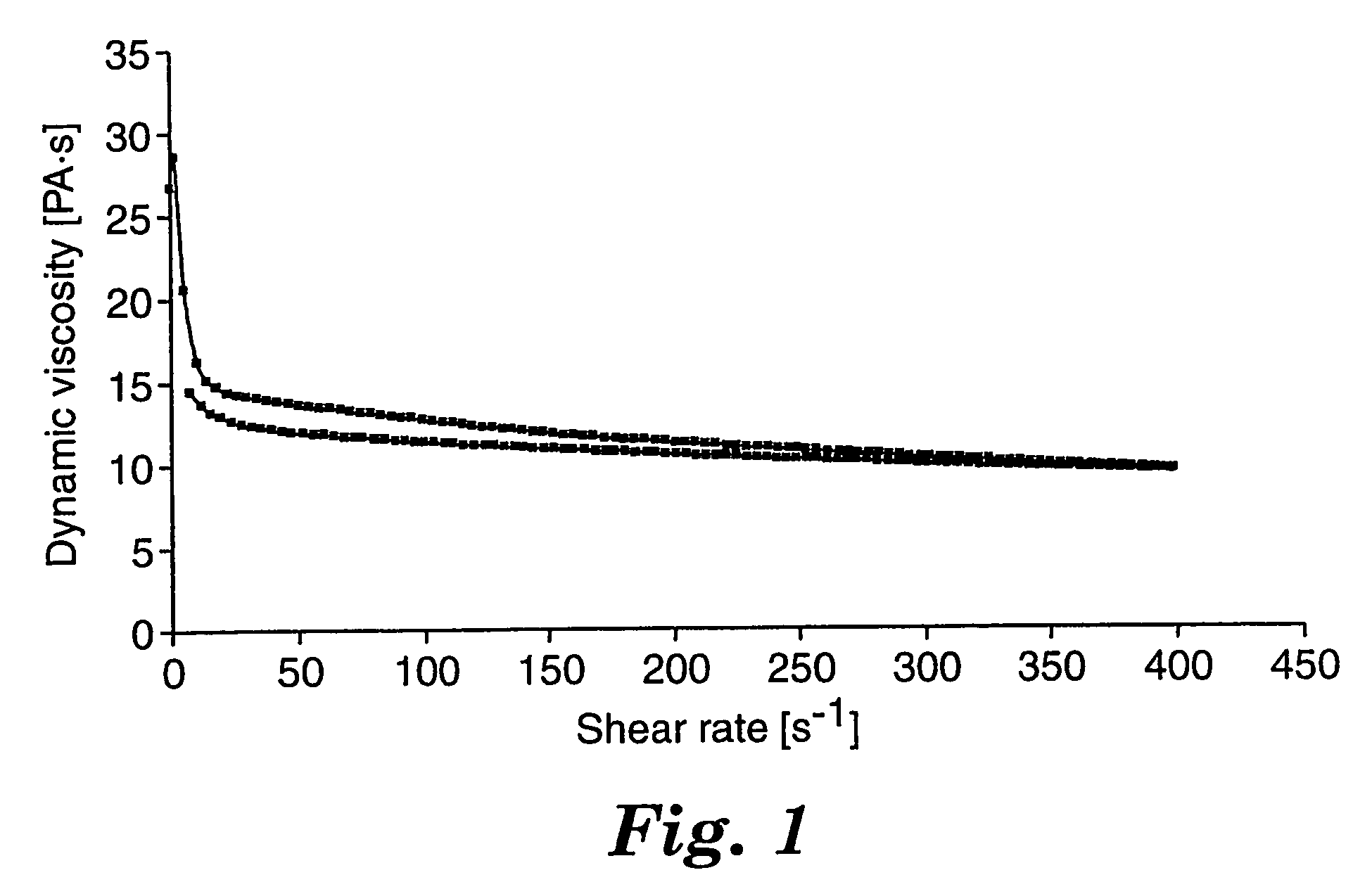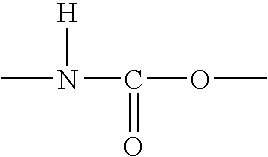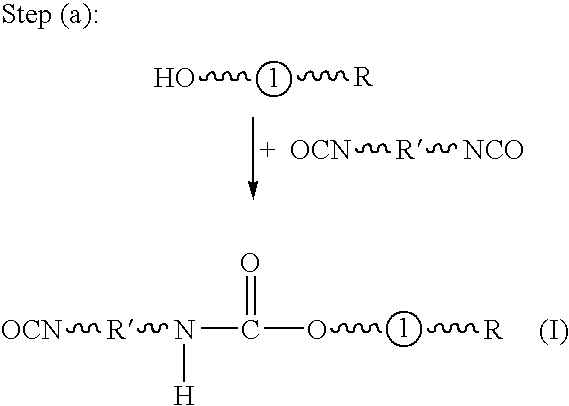Free-radically radiation-curable, solvent-free and printable precursor of a pressure-sensitive adhesive
a technology of free radical radiation and solvent, applied in the direction of synthetic resin layered products, domestic applications, optical articles, etc., can solve the problems of inability to meet the requirements of many applications, the shape of the substrate to be adhered, and the difficulty of die-cutting of adhesive tape, etc., to achieve the effect of reducing the number of applications, reducing the cost of adhesive tape, and improving the quality of adhesive tap
- Summary
- Abstract
- Description
- Claims
- Application Information
AI Technical Summary
Benefits of technology
Problems solved by technology
Method used
Image
Examples
examples 1-5
[0199]The acrylate functional oligomer materials were combined in form of the commercially available mixture GENOMER 4188 and GENOMER 4269 in a glass vessel and mixed for 30 minutes. The remaining materials were added and the resulting mixture was stirred for an additional 1 hour. The amounts of the mono- and di-acrylate functional oligomers, respectively, given in Table 1, were calculated from the respective amounts of GENOMER 4188 or 4269. Likewise, the amounts of the monomer EHA and 2-acrylic acid 2-(((acryl-amino) carbonyl) oxy) ethylester (=GENOMER 1122) contained in GENOMER 4188 and 4269, respectively, are included in the respective amounts given for such monomers.
[0200]Viscosity measurements were made on the uncured precursor of the pressure-sensitive adhesive according to the cone and plate method for determining dynamic viscosity described above under Test Methods. Results of viscosity measurements are summarized in Table 1.
[0201]The precursor of the pressure-sensitive adhe...
examples 6 and 7
[0203]Adhesive precursors having the chemical composition as shown in Table 1 were prepared, coated and fully cured by the same method as employed in Examples 1-5, with the exception that fumed silica was added to the adhesive precursor. The addition of fumed silica increased the viscosity of the uncured adhesive precursor as compared to Example 1 (Table 1) and allowed thicker adhesive coatings to be generated. The amounts of the mono- and di-acrylate functional oligomers, respectively given in Table 1, were calculated from the respective amounts of GENOMER 4188 or 4269. Likewise, the amounts of the monomer EHA and 2-acrylic acid 2-(((acryl-amino)carbonyl)oxy) ethylester (=GENOMER 1122) contained in GENOMER 4188 and 4269, respectively, are included in the respective amounts given for such monomers.
[0204]Properties of the cured pressure-sensitive adhesive layers made from the precursors of Examples 6 -7 are shown in Table 4.
[0205]
TABLE 1Ex. 1Ex. 2Ex. 3Ex. 4Ex. 5Ex. 6Ex. 7Componentwt....
examples 8-11
[0206]Adhesive precursor compositions shown in Table 2 were prepared employing four tackifying resins, respectively. Tackifying resins chosen did not interfere with the polymerization of the adhesive precursor, and upon full curing pressure-sensitive adhesives having slightly improved tack in combination with good shear properties were obtained as shown in Table 4. The amounts of the mono- and di-acrylate functional oligomers, respectively given in Table 2, were calculated from the respective amounts of GENOMER 4188 or 4269. Likewise, the amounts of the monomer EHA and 2-acrylic acid 2-(((acryl-amino)carbonyl)oxy)ethylester (=GENOMER 1122) contained in GENOMER 4188 and 4269, respectively, are included in the respective amounts given for such monomers.
[0207]The adhesive precursor was coated onto a polyester film at a thickness of 50 μm and fully cured according to the procedure described under Examples 1-5.
[0208]
TABLE 2Ex. 8Ex 9Ex. 10Ex. 11Componentwt. %wt. %wt. %wt. %Mono acrylate f...
PUM
| Property | Measurement | Unit |
|---|---|---|
| dynamic viscosity | aaaaa | aaaaa |
| glass transition temperature | aaaaa | aaaaa |
| glass transition temperature Tg | aaaaa | aaaaa |
Abstract
Description
Claims
Application Information
 Login to View More
Login to View More - R&D
- Intellectual Property
- Life Sciences
- Materials
- Tech Scout
- Unparalleled Data Quality
- Higher Quality Content
- 60% Fewer Hallucinations
Browse by: Latest US Patents, China's latest patents, Technical Efficacy Thesaurus, Application Domain, Technology Topic, Popular Technical Reports.
© 2025 PatSnap. All rights reserved.Legal|Privacy policy|Modern Slavery Act Transparency Statement|Sitemap|About US| Contact US: help@patsnap.com



